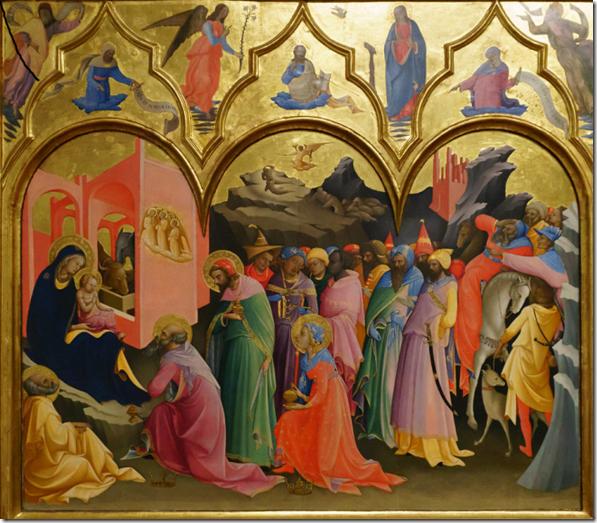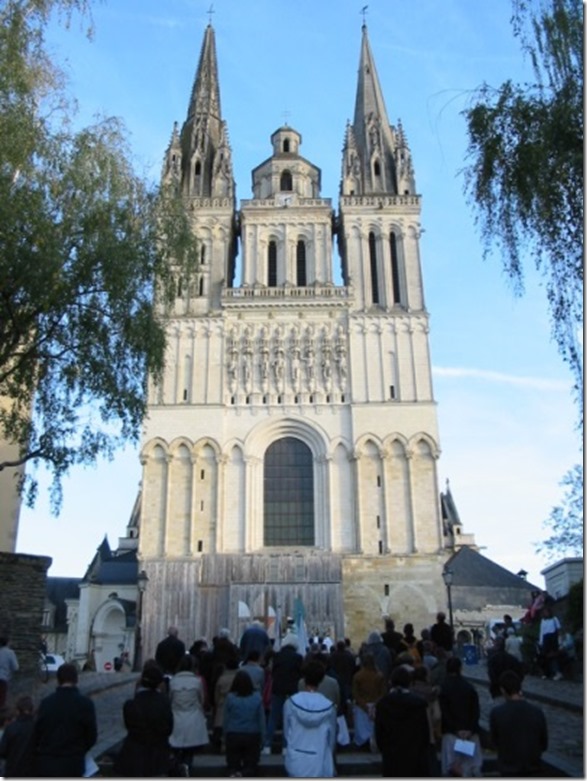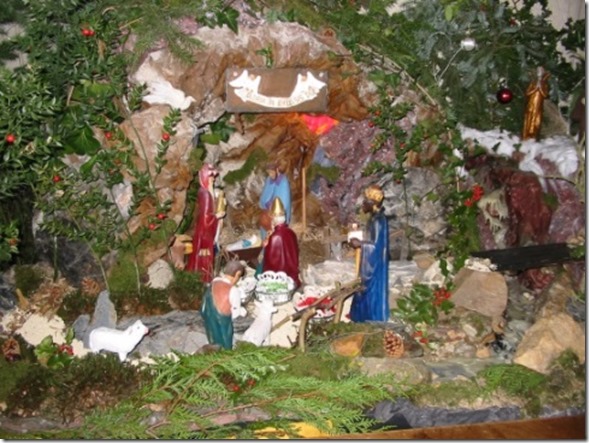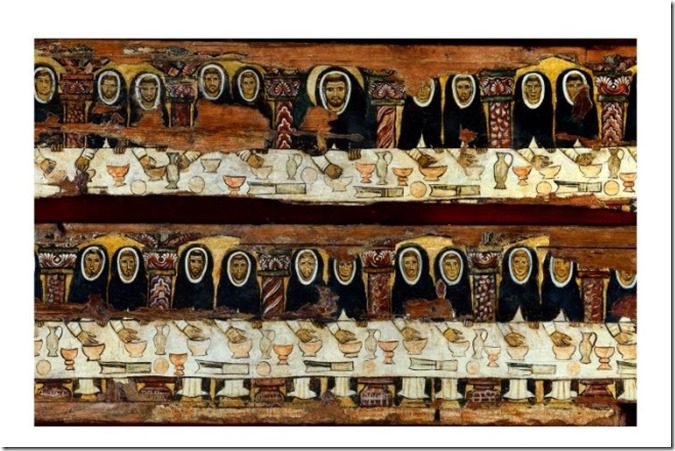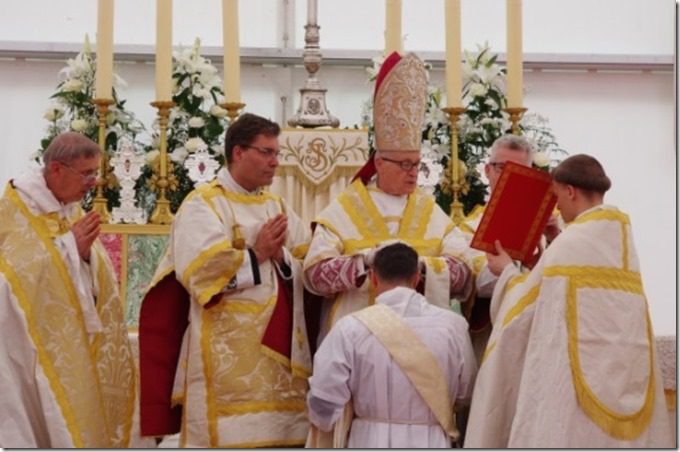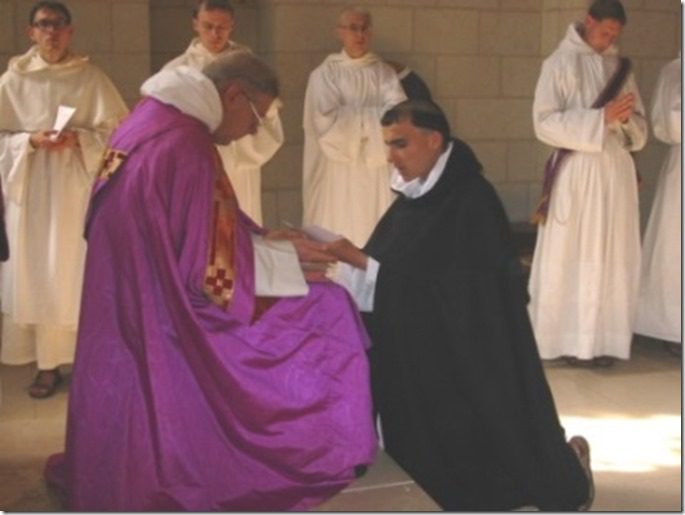Devotion to the Holy Face and the Golden Arrow
Sister Marie de Saint-Pierre (1816-1848)
from Le Sel de la terre 110, Autumn 2019
(continued)
Gravity of Blasphemy
“He made me understand that men are incapable of understanding the insult done to God by this sin of blasphemy; blasphemies pierce His heart and make Him a second Lazarus covered with wounds (Luke 16, 20). He invited me to imitate the dogs who comforted poor Lazarus by coming to lick his wounds; I would do Him a great service by employing my tongue to glorify every day the most holy Name of God despised and blasphemed by sinners, without considering whether this exercise gave me interior consolations; it would be enough for me to think that I was healing His divine wounds and causing Him great satisfaction.”
The Holy Face of Christ Offended by Blasphemies
“I understood that, as the Sacred Heart of Jesus is the sensitive object offered to our adoration to represent His immense Love in the most holy Sacrament of the altar, so, in the work of reparation, the Face of Our Lord is the sensitive object offered to the adoration of the associates to repair the outrages of the blasphemers who attack the Divinity of which it is the figure, mirror, and expression. By the virtue of this adorable Face, presented to the eternal Father, we can appease His anger and obtain the conversion of the impious and blasphemers.”
“Our Lord made me see that the Church, His Spouse, is His mystical Body, and that religion was the face of this body; then He showed me this face in the face of the enemies of His Name, and I saw that the blasphemers and the sectarians were renewing on the Holy Face of Our Lord all the opprobrium of His Passion. I saw, thanks to this divine light, that the impious, by uttering evil words and blaspheming the Holy Name of God, were spitting on the Face of the Savior and covering it with mud; that all the blows given by the sectarians to the holy Church, to religion, were the renewal of the many blows that the Face of Our Lord received, and that these unfortunate people were making this august Face sweat by striving to annihilate its works.”
“Our Lord showed me, with the help of a simple and just comparison, that the impious by their blasphemies attacked His adorable Face, and that the faithful glorified it by the homage of praise rendered to His Name and to His person.”
“Merit is in persons, but the glory that accompanies them is in their name; it bursts forth when it is pronounced; the merit or demerit of a person passes into his name. The most holy Name of God expresses the divinity, and contains in it all the perfections of the Creator; it follows from this that the blasphemers of this sacred Name attack God himself. Now let us remember these words of Jesus: “the Father is in me and I in the Father.” (Jn. 10:38). Jesus made Himself passible by the Incarnation; and He suffered, in His adorable Face, the outrages done by the blasphemers to the Name of God, His Father.”
“Our Lord has shown me that there is something mysterious about the face of a despised man of honor; yes, I see that his name and his face have a special connection. Behold a man distinguished by his name and merits, in the presence of his enemies; they do not lay hands on him, but they overwhelm him with insults, they add bitter derision to his name, instead of the titles which are due to him. Notice then what happens to the face of this insulted man; would you not say that all the outrageous words that come out of the mouths of his enemies come to rest on his face and cause him to suffer a real torment? We see this face covered with redness, shame, and confusion; the opprobrium and ignominy it suffers are more cruel to bear than real torments in the other parts of its body. Well, here is a weak portrait of the Face of Our Lord outraged by the blasphemies of the impious! Let us represent this same man in the presence of his friends, who, having learned of the insults he has received, hasten to console him, to treat him according to his dignity, pay homage to the greatness of his name by calling him by all his titles of honor; do you not then see the face of this man feel the sweetness of these praises Glory rests on his forehead and, shining on his face, makes it all shiny: joy shines in his eyes, a smile is on his lips; in a word, his faithful friends have healed the bitter pain of this face outraged by his enemies, glory has passed the reproach. This is what the friends of Jesus do through the work of reparation; the glory they give to His Name rests on this august forehead, and rejoices His most Holy Face, in a very special way, in the most holy Sacrament of the altar.”
Healing the Blasphemers
• 3 November 1845:
“According to the care you will take to repair My portrait, which was disfigured by blasphemers, I will take care to repair yours, which was disfigured by sin. I will reprint My image on it, and I will make it as beautiful as it was when it came out of the font of baptism. Abandon yourself therefore into My hands and be willing to suffer all the operations necessary for the restoration of this image. Do not be troubled if you experience sadness and darkness, for you know that in an image, the dark colors serve to bring out those that are more vivid. Men have the art of restoring bodies; but only I can be called the restorer of souls, and who restores them to the image of God. I have made known to you this work of reparation, I have shown you its excellence, and now I promise you the reward.”
“Oh! If you could see the beauty of my Face! Your eyes are still too weak!”
• 5 January 1846:
“Our Lord made me aware that Lucifer willingly left to other demons the care of leading other flocks of sinners, such as for example: the impure, the drunkards, the greedy; but the blasphemers form his favorite flock. He made it known to me that this work of reparation embraces not only the reparation of blasphemy proper, but also that of all other blasphemies uttered against religion and the Church; however, it applies especially to blasphemies of the Holy Name of God.”
[…]
Changing the Wine of Justice Into the Wine of Mercy
“I saw other punishments prepared to satisfy this Justice. When I saw this, I said to Our Lord : Sweet Jesus, if only I could drink the rest of this cup, so that my brothers might be spared!”
“He answered me that He accepted my good will, but that I was not capable of emptying this cup, and that only He could drink it. The Savior, seeing my pain, beckoned me to enter His divine Heart; in His excessive mercy, He gave it to me as a vessel worthy of being presented to the eternal Father to receive this wine of His wrath, making me understand that, passing through this channel, it would be changed for us into the wine of mercy. But He does not want to entirely infringe the rights of justice; if I may express myself in this way, He wants to make a covenant between His justice and His mercy, and for this purpose He asks for the establishment of the work of Reparation to the glory of His Name. Yes, He will disarm the anger of God, His Father, if He offers Him a work of reparation for us! Is it not the least we can do, O sweet Jesus, to make reparation by our prayers, by our groans and by our adoration, for the enormous sins of which we are guilty towards the majesty of God? This, Mother, is the prayer that Our Lord put into my mouth, and which I want to repeat unceasingly:
‘Eternal Father, look upon the divine Heart of Jesus which I offer to you to receive the wine of your justice, so that it may be changed for us into the wine of mercy’.
He made me understand that, each time I made this offering, I would obtain a drop of this wine of divine anger, which, falling, as I said above, into the vessel of the sacred Heart of Jesus, would change into the liquor of mercy.”
Waging War on the Communists
In 1847, the League of Communists was founded in London. Two of its members, Marx and Engels, received the mission to write the doctrinal manifesto that appeared in February 1848 under the title Manifesto of the Communist Party 1.
On March 14, 1847, Sister Marie de Saint-Pierre wrote to her superior:
“Our Lord today, after Holy Communion, made me understand that the plagues we have been struck with were only the forerunners of those which His justice is preparing for us if His anger is not appeased, and He showed me the sins of blasphemy and the profanations of Sunday under the emblem of two pumps, with which the men who are guilty of these crimes draw the waters of His wrath over France and expose themselves to being submerged by them, if this work of reparation which He gives her in his mercy as a means of salvation is not established. Then He told me that the sectarians called Communists had only made one excursion: ‘Oh’! He added, ‘if you knew their secret and diabolical machinations, and their anti-Christian principles! They are only waiting for a favorable day to set fire to France. Ask, therefore, for the work of Reparation to whom it belongs, in order to obtain mercy.’”
• 29 March 1847:
“Our Lord has entrusted me with a new mission which I would be afraid of if I were anything; but as I am nothing but a weak instrument in His powerful hand, I am perfectly at peace.
He commanded me to make war on the communists, whom He told me were the enemies of the Church and of His Christ, making me understand that these lion cubs were, for the most part, born in the Church whose cruel enemies they now declared themselves to be. Then He added:
‘I have made it known to you that I hold you in My hands like an arrow. Now I want to shoot this arrow at My enemies. I give you the weapons of My Passion to fight them: My Cross, whose enemies they are, and the other instruments of My torture. Go to them with the simplicity of a child and the courage of a valiant soldier. Receive, for this mission, the blessing of the Father, the Son and the Holy Ghost’.
Then I prayed to the Blessed Virgin to be the custodian of these divine weapons, given to me by her dearest Son, who is compared to the Tower of David, from which hang a thousand shields. Our Lord gave me, on this subject, several other lights which it would not be easy for me to relate. “Lord,” I said, “train my hands for battle, and teach me to use your instruments.”
He said to me:
‘The weapons of My enemies give death, but Mine give life.’
How to Fight the Enemies of God
This is the prayer I often recite for this purpose:
Eternal Father, I offer you, against the camp of your enemies, the Cross of Our Lord Jesus Christ and all the instruments of His holy Passion, that You may put division between them; for, as Your beloved Son has said, every kingdom divided against itself will be destroyed [Mt. 12:25].
[…] Jesus gives me grace to draw my weapons; today, after Holy Communion, He encouraged me to fight, and He promised to give me a cross of honor, which, He told me, would open heaven for me, if I were faithful […]. But, Reverend Mother, after having fought the enemies of God with all my strength during these three days of feasting, I now feel almost contrition. I explain myself: it is because I fear having made imprecations against them.
I know that the holy King David does the same in his psalms (108, for example); but I do not know if I am allowed to do so. Finally, I have said everything that Our Lord, it seems to me, inspired me to say; if it is wrong, and I am mistaken, I will not do it again.
I will tell you that I begin by placing my soul in the hands of Our Lord; then I beg him to bend His bow and shoot His arrows at His enemies; then I fight them first by His Cross and by the instruments of His Passion, as He taught me; then by the virtue of the most holy Name of God. And this is my concern for the imprecations, for if it is wrong, I have repeated these words a hundred times; but I had no intention of wishing harm to these criminal people; I am only angry at their malice and their passions; I only want to kill the old man in them. So this is what I say:
Let God arise, let His enemies be dispelled, and let all those who hate Him flee from His face.
May the name of the thrice holy God overturn all their plans.
May the sacred name of the living God divide all their feelings.
May the terrible name of the God of eternity destroy their impiety.
I say some more, and when I have thus beaten them well, I add:
I do not want the sinner to die, but to be converted and live. Father, forgive them, for they know not what they do.” [Lk. 23:34]
I do these exercises without restraint of spirit and with great ease, because I let myself be led by the grace that guides me.
PROMISES OF OUR LORD JESUS-CHRIST
revealed to sister Marie de Saint-Pierre
1. By offering My Face to My Eternal father, nothing will be refused, and the conversion of many sinners will be obtained.
2. By My Holy Face, they will work wonders, appease the anger of God, and drow down mercy on sinners.
3. All those who honor my Face in a spirit of reparation, will by so doing perform the office of the pious Veronica.
4. According to the care they take in making reparation to my Face disfigured by blasphemers, so will I take care of their souls which have been disfigured by sin. My Face is the Seal of the Divinity, which has the virtue of reproducing in souls the image of God.
5. Those who, by words, prayers or writings defend My cause in the work of reparation, especially My priests, I will defend before My Father, and will give them My kingdom.
6. As in a kingdom they can procure all that is desired with a coin stamped with the king’s effigy, so in the Kingdom of Heaven they will obtain all they desire with the precious coin of My Holy Face.
7. Those who on earth contemplate the wounds of My Face shall in Heaven behold it radiant with glory.
8. They will receive in their souls a bright and constant irradiation of My Divinity, that they by their likeness to My Face they shall shine with particular splendor in Heaven.
9. I will defend them; I will preserve them, and I assure them of final perseverance.





